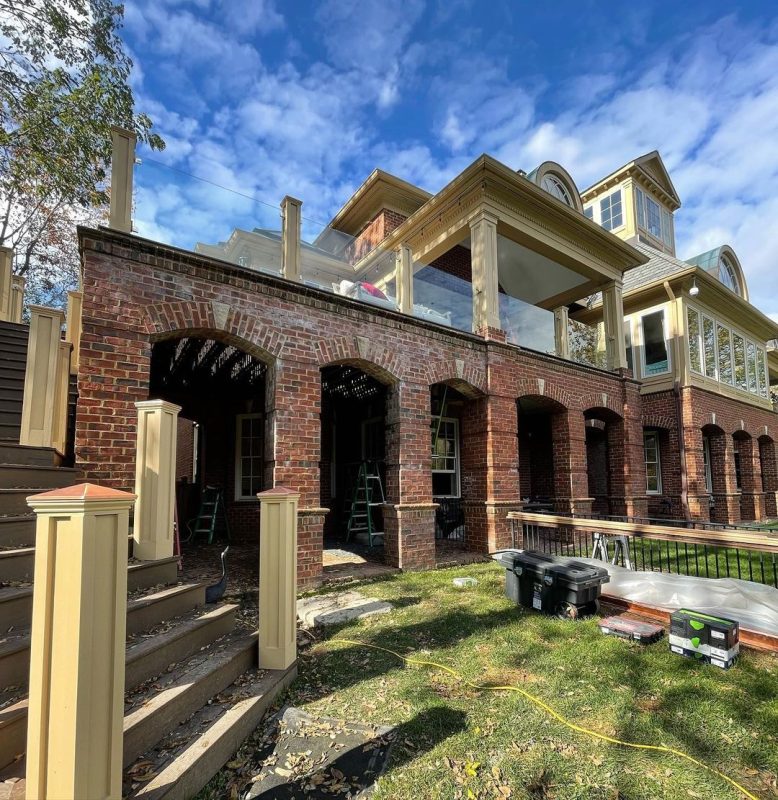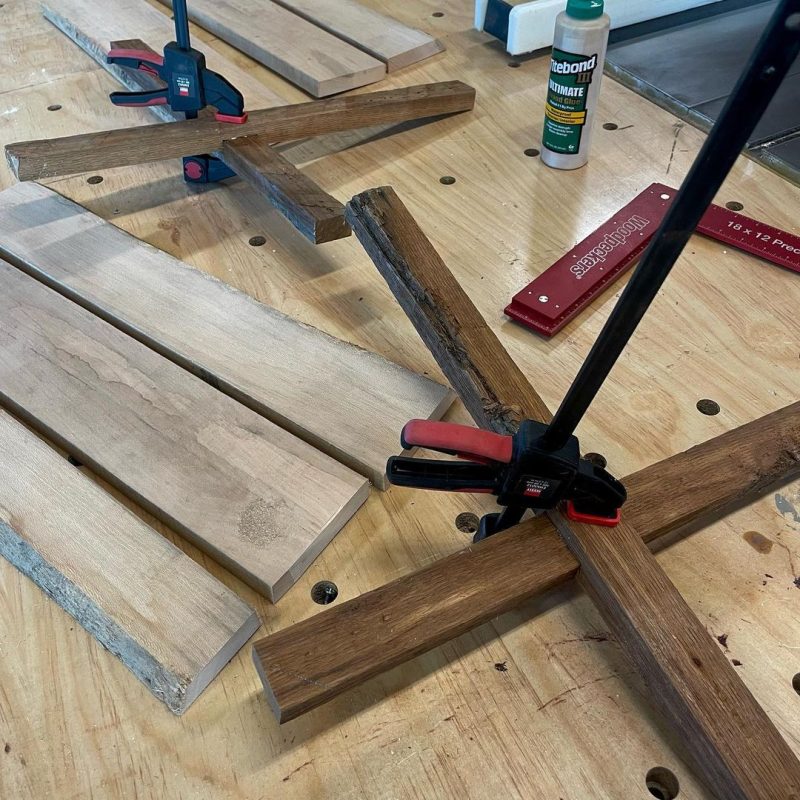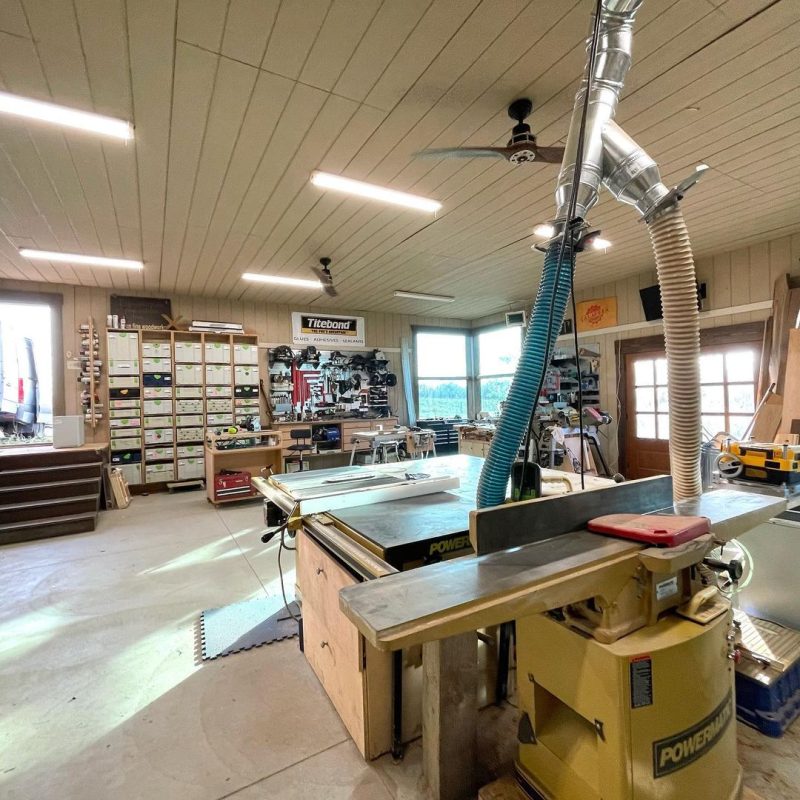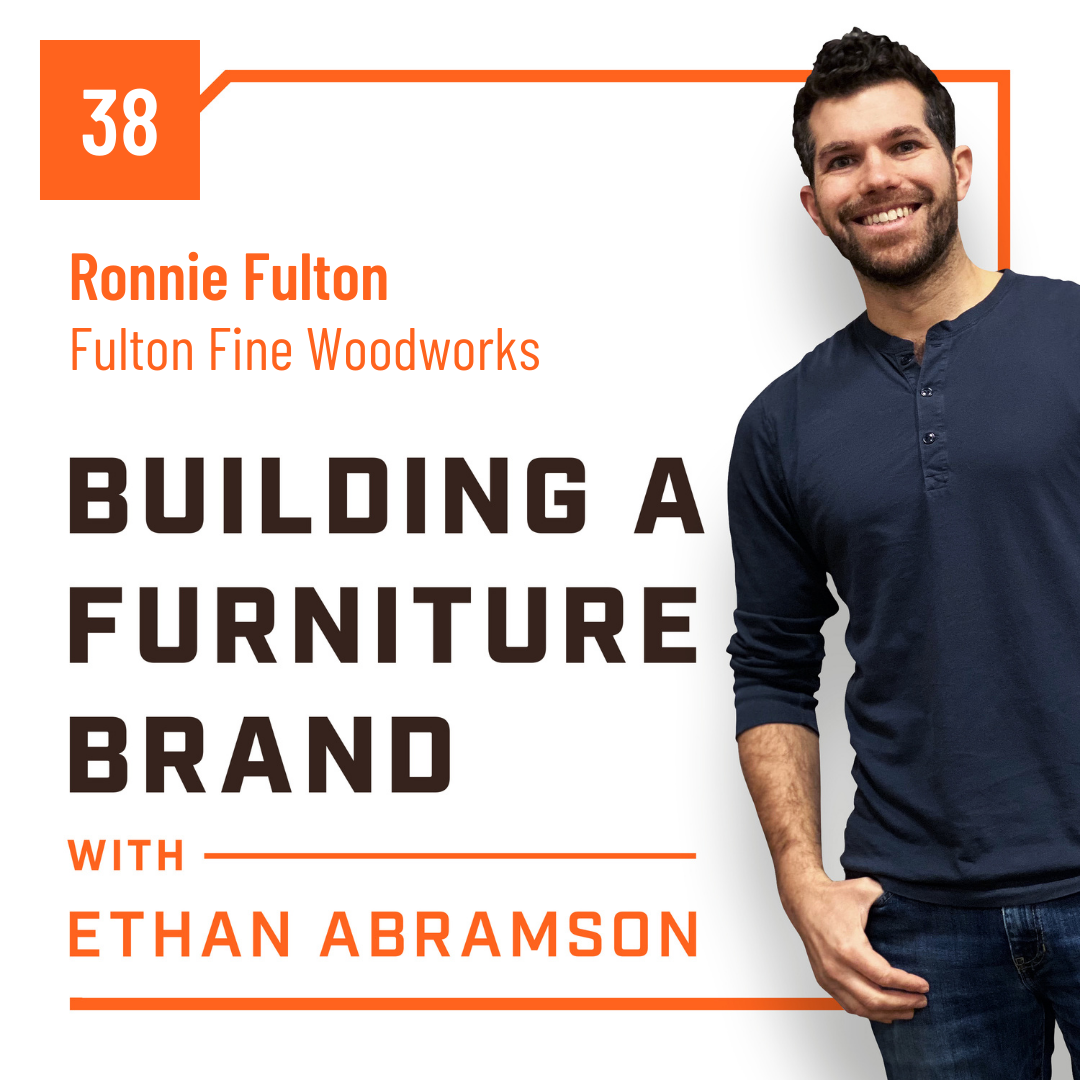Keeping The Trades Alive with Ronnie Fulton of Fulton Fine Woodworks
This episode is brought to you by Jobber – getjobber.com/ethan
Welcome to Building a Furniture Brand with Ethan Abramson, the show that talks about the business behind the furniture business. In this episode, Ethan sits down with Ronnie Fulton, owner of the Central Kentucky-based furniture company, Fulton Fine Woodworks.
Ronnie put in his time in the corporate world before he decided that following his dreams of owning his own furniture company was right for him. But once he made that jump, he never looked back, making a name for himself as a high-end builder who would take on projects that no one else could do.
This willingness to tackle challenges set him apart in the industry and put him in the very enviable position to be able to charge for what he needs to make on each project and charge for what he wants to make on each project. Follow along as they talk about how you move from working in the corporate world to working for yourself, the way you can check your pricing nationally, why going into the trades used to be frowned upon, and much more.

This Old House to His Own House
“The earliest I can remember back is about age five. I would know when This Old House was coming on, which was the closest thing we have probably had to, like an HGTV, and I would wait for that show to come on. I just love to watch the building process. At that early age and in stores, I would pick up magazines that were building magazines. That’s where my interest was.
I was in the generation of school where it was like, ‘What type of college degree do you want to get?’ The closest thing that my counselors thought that I needed to be was an architect. So I took drafting for four years in high school, and I like to draw, so I thought, ‘Hey, you know, that’s what I want to be; An architect.’
In the first semester, I dropped out because I realized that I did not want to pursue life at a desk drawing. I didn’t know it at the time, but I actually wanted to do the work. And I put a lot of blame on the educational system where the practice was that you don’t do vocational trade work; you can’t make it in life like that. A lot of people my age were told that, and I think we’re seeing the results of that right now. A shortage of people in the trades.”
- Ronnie Fulton
After dropping out of his architectural program, Ronnie fell back on a burgeoning tech knowledge. His computer background from high school landed him a job at Lexmark and later Toyota’s corporate headquarters. Ronnie spent fourteen years at Toyota, and while he liked it, he still felt something was missing.
While working his corporate jobs, Ronnie never stopped working on his own house and amassing a tool collection. This growing knowledge meant that he started building furniture, built-ins, and remodeling constantly. That childhood desire never left him, but Ronnie found himself still thinking that it was not possible to make a living working in the trades like that.
Eventually, Ronnie’s wife discovered that she had cancer while the couple had a one and three-year-old. While it was a scary time in their lives, they made it through, and she got clear, but that informed the pair that life is short. That was thirteen years ago. They leaped into their own business and have never looked back.

A Front Row Seat to Change
Ethan and Ronnie discuss how the culture has shifted since the days that Ronnie was in school. Currently, there is an enormous premium on the skills of building things, especially custom and unique items, but it wasn’t always that way. Ronnie feels that he witnessed that shift from his childhood to where he is today.
“I feel like I had a front-row seat to that change. Because I remember very clearly in high school when a kid wasn’t doing well in grades, the common thing that the counselors suggested was that they need to look at going to vocational school. All I knew in my mind, I thought when you went on that bus to that vocational school, it meant you were a loser like you were borderline future prison material. That’s the way they acted.
And now to know that those kids were going to mechanic school, welding, framing, carpentry, I should have been on that bus. I did not realize that until I was out of high school for like 15 years, my counselors did not do a good job of figuring out what I should be doing because I was on the wrong path. But I didn’t want to go down that path because I was told that that was the wrong path.
It’s so wrong, especially today. But even at that time, you could get out and make really good money through tool and die, welding, all those careers have always paid really good money. But I think that my parent’s generation had it ingrained in their heads, go to college, it’s not about a trade, it’s about going to college, and I think all of our parents listened. So now we have an entire generation of college graduates with no skills.”
- Ronnie Fulton

Finding the Core of His Business
One of Ronnie’s challenges when building his woodworking business is the competition from retirees and weekend warriors. Since they are taking on these jobs for fun, on the side, or for just a little extra money, they can afford to be significantly cheaper than someone running a fully-fledged business.
To combat that, Ronnie has built his reputation on being the guy who takes on the jobs that are hard to build or that people say can’t be done. He has found that small, manageable projects are too easy to get undercut from, so he focuses on complex high-skill projects. Ronnie’s reputation has reached the point that many of his projects come as referrals from other woodworkers who will tell their customers to contact him. Due to this complexity, Ronnie has developed his own unique pricing model.
“The technique I use is not something you would learn in a school book of business. I’m sure everybody hears about overhead and all those principles. So the first few years I was in business, I spent a lot of time figuring out what my overhead was, how much do I need to make each day to break even. Even when you don’t have a lot of overhead, it’s surprising how high that can be.
So knowing that is always a good thing to have. It’s something that somebody, in the beginning, is not considering. They’re thinking, ‘Well, I made $300 a day.’ Well, if your overhead is $300 a day, you didn’t make anything. So right off the bat, I try to estimate how much time a project will take, and I take my overhead for the day each day. I keep that in mind, and then I’ll figure out how much the materials will be. That figure is sometimes higher than what people would even think. That’s why it’s good when you’re dealing with high-end clients and corporations because there’s a little bit more wiggle room on that kind of thing.”
- Ronnie Fulton
Paying the Knowledge Forward
With his years of experience, no-nonsense approach to handling pricing and client relations, Ronnie has a lot of advice to impart to beginning woodworkers and furniture makers. However, he distills the most critical piece of advice down to the simple question of ‘What do you enjoy building?’
“What would you like to build all day if money wasn’t a factor? I like to look at that. Then I’d like to see how you could dominate that industry, whatever that is. If you want to build tables, or you want to specialize in custom built-ins, or whatever you want to specialize in. I think that’s the key.
Also, after every project, I always do a reflection. Sometimes a reflection just means driving in the car away from the job. I always think about what went well, what didn’t go well, what I would do differently, what will never happen again. You don’t see the benefits of that really fast, but if you do that for 13 years, you really start running a well-oiled machine, and you start realizing quickly what type of projects you’d like and what kind of projects you don’t like.
As long as you get an understanding of that in your brain, when potential clients come up to you, whether it’s on the street, at a convention or whatever when they’re talking, you’re listening, and you’re saying, ‘Does this meet with the projects that I seem to be perfectly fitted for?’
And when they don’t, you can be confident about saying no because you realize that you’ve done that kind of thing before, and it’s nothing but a headache. I think as long as you can learn from your mistakes, you can go after whatever type of specialty build you want.”
- Ronnie Fulton
Instagram: @fultonfinewoodworks
YouTube: fultonfinewoodworks

